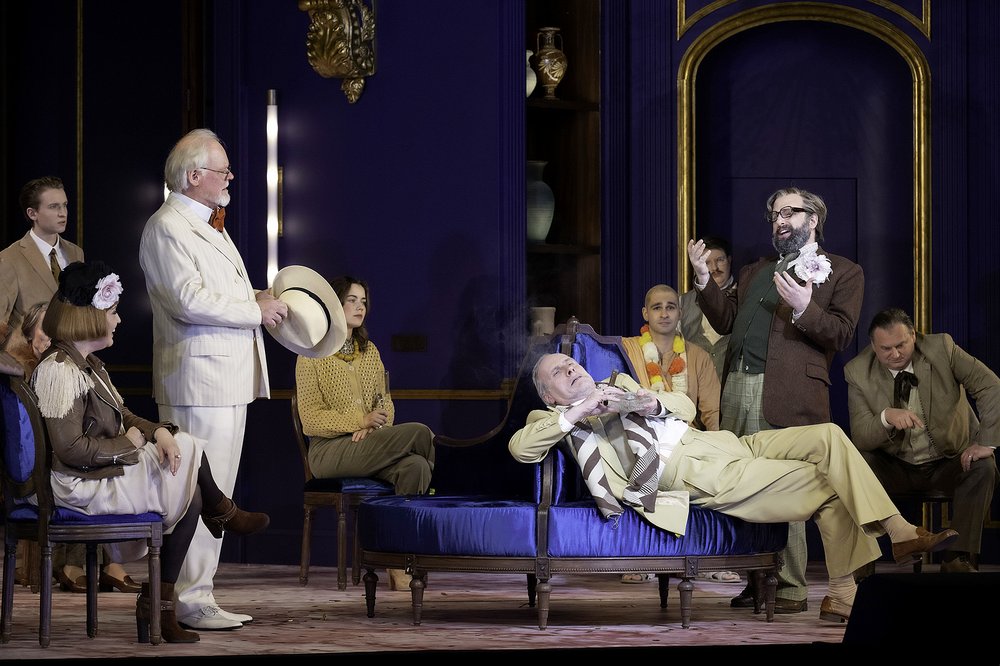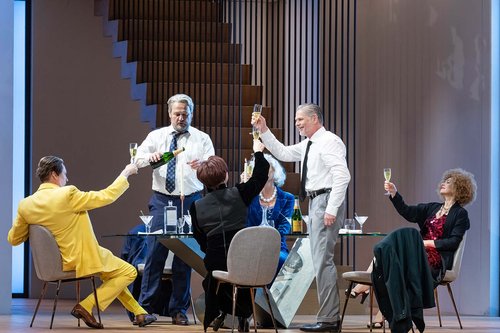Myth in a Family Drama

Ariadne auf Naxos. Composed by Richard Strauss. Produced by Dmitri Tcherniakov. Photo courtesy of Monika Rittershaus
A new production by Dmitri Tcherniakov of Richard Strauss's ‘Ariadne auf Naxos’ at the Hamburg Staatsoper transforms the opera into an intimate family drama, completing his Strauss trilogy at the house alongside ‘Elektra’ and ‘Salome’.
Following hot on the heels of Richard Strauss’s (1864-1949) ‘Elektra’ and ‘Salome’ staged by Dmitri Tcherniakov (b. 1970) with conductor Kent Nagano (b.1951) in Hamburg is ‘Ariadne auf Naxos’. Tcherniakov is a Moscow-born opera director with a stellar international career who since the 2010s has been working mostly in Western Europe and North America.
Looking at the titles of the three performances one might reasonably assume that, apart from the figure of the composer himself and his faithful collaborator, writer and librettist Hugo von Hofmannsthal (1874–1929), they are united by a ‘female theme’. Heroines are a constant in Tcherniakov’s work, his female protagonists regularly confront the cruelty and hypocrisy of this world. However, in the case of the ‘Strauss Trilogy’ this is downgraded. The key theme here is our human attachments with friends and relatives dominated by typical daily conflicts or mortal offences, and where the wider conflicts and collisions of the outer world feel remote.
In Tcherniakov's interpretation, the ancient and biblical themes so loved by Strauss and Hofmannsthal are evocative of a family saga, the action all taking place in an every day apartment with only small details changing throughout. This inhabited and domestic space gives all three productions – Elektra, Salome and Ariadne auf Naxos – a sense of real intimacy and brings the kind of psychological authenticity to the relationships of the characters that you normally see in the cinema rather than the theatre.
In the case of Ariadne, it is not easy to bring a sense of psychological realism to the production. In ‘Elektra’ and ‘Salome’ Hofmannsthal relied on powerful literary sources, the plays of Sophocles and Oscar Wilde but his ‘Ariadne auf Naxos’ evolved from an amateur artists’ party that Strauss and his librettist had organised as a gift for their contemporary, the eminent German director Max Reinhardt (1873–1943). All three operas were staged at the first ever Salzburg Festival. And while Strauss's music in ‘Ariadne’ is interesting in its transition from expressionism to neoclassicism (some fragments of the score bring to mind Mozart or Schubert), the opera's libretto (in both stage editions) seems unsuitable for anything other than the aforementioned amateur production. Molière's play ‘Le Bourgeois gentilhomme’, ancient Greek myth, Italian masks, the ‘theatre within theatre’ trope – everything is mixed up and confused in this opus by the prolific Austrian.
An aristocrat organises a feast at his villa where he wants the actors to perform the myth of Ariadne abandonned by Theseus, while others must act out a frivolous plot from the Commedia dell'Arte, either before or after. However, in the end, instructed by his patron, the butler tells the actors they must stage both plots at the same time. The composer, prima donnas, music teacher, footman, hairdresser and performers all rush around the stage trying to work out how to cross a snake with a hedgehog. This is the prologue of this strange opus. In the main part, the will of the aristrocrat is fulfilled as both plots are played on stage at the same time. Ariadne suffers, the maid Zerbinetta from the Commedia dell'Arte explains to her that a new lover can take the place of the lost one, and as proof of this she demonstrates her own numerous affairs. In the finale, the title character is comforted in the arms of Bacchus. The curtain comes down.
It is difficult to find any logic in all of this craziness. But Tcherniakov is able to write his own plots on top of the existing libretto without changing any of the words, which naturally cannot be simply taken out of arias and recitatives. The relationships between the characters in his production are radically rethought. The butler is transformed into the master of the house and is called Theseus (this is a non-singing role in Strauss’s opera, and it is played by the wonderful and very ironic dramatic actor Wolfram Koch, b. 1962). The actress invited to play Ariadne becomes the wife of the host named Ariadne. Guests gather in the flat to celebrate the couple's silver wedding anniversary. The music teacher turns out to be the protagonist's father, the composer is his pupil, the nymph and naiad performers are Ariadne's relatives and friends, scatty Zerbinetta is her cousin, and Bacchus is Zerbinetta's new boyfriend. It is a close-knit circle of friends and relatives. And Theseus is the soul of the party who instigates everything, spouting half baked ideas, handing out pages of his funny home made libretto to his family and friends, and sometimes changing the script halfway through the performance. At the end of the prologue, he suddenly drops dead of a heart attack. That is how Ariadne loses her Theseus and how their flat turns into Naxos.
The entire subsequent ‘performance within a performance’ becomes Tcherniakov's natural continuation of the prologue. Three months have passed, and Ariadne is still full of grief, her friends and relatives try to bring her back to life even coming up with a witty Commedia dell'Arte performance to lift her out of her bitter thoughts. They find pages from Theseus’s scripts on shelves and in cupboards and try to draw her back into the illusory world her husband once invented.
Cousin Zerbinetta, sung by Nadezhda Pavlova (b.1980), is in charge of this theatrical whirlwind, finding herself at the centre of the production’s narrative and also at its musical heart, as she overshadows renowned German Italian opera singer Anja Kampe (b. 1968) who performs the title role. At Zerbinetta's request, her boyfriend played by Jamez McCorkle (b.1990) tries out the role of Bacchus who happily joins the others to try to rescue Ariadne. He sings his part while holding the pages of the libretto left behind by Theseus, thus apparently resurrecting his spirit. This unexpected reincarnation finally helps Ariadne to find peace of mind and return to the realm of the living from the realm of the dead, where she had mentally been stuck after the death of her husband.
Building intimacy and a sense of authentic psychology through the action in traditional operatic plots has long been a trademark of Tcherniakov, but in Ariadne this stylistic device also acquires the significance of a public statement. The first version of the opera appeared on the eve of World War I, which quickly destroyed the atmosphere of domestic festivities in Ariadne auf Naxos. Tcherniakov rhymes the premonition of disaster within Strauss's music with the present-day sense of impending catastrophe. This rhyme is explicitly proclaimed in the final subtitles and mise-en-scene: Theseus and Ariadne's apartment starts to rotate on the stage's turning circle and before our eyes it turns into something resembling an island where the characters are trying to escape from a world that is becoming more and more frightening and unpredictable.
We have neither the power nor the ability to influence the course of history. Our inner circle is all we have left and this is the central message of Dmitri Tcherniakov's Ariadne on Naxos. His production is a hymn to our private human ties, intimate bonds, and our soulful attachments. When the world collapses, it is only they that can be our source of support and it is in them that we can find our salvation.

















